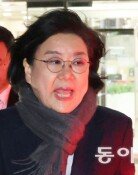Policy Flip-flops Add Confusion to Economy
Policy Flip-flops Add Confusion to Economy
Posted September. 06, 2004 21:46,
The presidents office, the ruling Uri Party, and government agencies are finding themselves cacophonous over the framework of real estate policies and other major economic policies.
Major government policymakers are sending mixed signals, contributing to further contracting real estate dealings, some analysts argue.
At a recent policy meeting, officials of the Ministry of Construction and Transportation decided to lift compulsory reports of real estate dealings in some areas. However, it reversed the decision on September 6.
It set itself apart from the decision made by the Uri Party and the government on August 17 to lift the report requirement for real estate dealings in some basic municipal units as soon as possible.
Construction Minister Kang Don-suk said at a press briefing on August 19, Apartment prices outside the Seoul metropolitan area and Choongcheong provinces have begun to become flat. He added, If there is any special issue pertaining to it, we are considering compulsory reports of real-estate dealings in these regions.
However, the ministry rescinded the decision as it believed it was warned against any attempts to enliven the housing market when the president recently said, I will take the initiative and prioritize the stabilization of the real estate market, even if that means other policy priorities should be sacrificed.
The lifting of overheated real estate speculative areas is the issue we should decide on after fall, a moving season, at least, said one Construction Ministry official, dimming the perspective that they will be lifted by years end.
Meanwhile, Rep. Hong Jai-hyung, who heads the policy committee of the Uri Party, released a press release called: The Uri Partys Line on the Ceiling on the Total Amount of Investment by Conglomerates on September 6. In it, he said, While the party will improve the rules governing the ceiling to reform the ownership types of conglomerates as its electoral pledge, it will maintain the framework of the ceiling until market transparency is secured.
The Uri Partys persistence on the investment ceiling by big corporations is reportedly affected by President Rohs recent remarks. In an interview with the TV network MBC on September 5, he said, while reconfirming his will against changes in the ceiling, I will keep the investment ceiling intact. It does not inhibit investment as many research institutes have concluded.
Prior to this, some Uri Party members, centering on the ad hoc committee for deregulation, had been arguing that the investment ceiling and other regulations that troubled entrepreneurs should be reviewed from scratch.
Reactions are also mixed on the recently hot debated issues and anti-corporate sentiment.
I believe the allegations that there is anti-corporate sentiment [within the government] to be groundless, President Roh said in an interview. When I asked them to show pro-labor policies or anti-corporate policies this government instituted since it took office, they hardly showed anything.
However, Lee Hyun-jai, deputy prime minister and minister of Finance and Economy, expressed concern about anti-corporate sentiment spreading through society and said at an international academic conference held in Yonsei University by the Korea Economics Association that the goals of the governments reforms are not the countrys family-owned conglomerates, but the market itself.
Nevertheless, a series of conflicting statements by government officials will end up stepping up anxiety rather than revamping investment, experts cautioned.





![“한동훈, 정치생명 걸고 무소속 출마해 평가받는 것 고려할만”[정치를 부탁해]](https://dimg.donga.com/c/138/175/90/1/wps/NEWS/IMAGE/2026/01/19/133186982.1.jpg)

